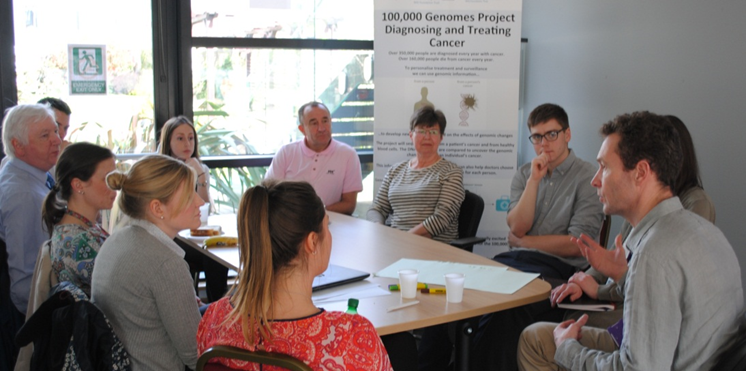Ground breaking Genomic Medicine Centre celebrates two year milestone

The team at Greater Manchester NHS Genomic Medicine Centre, based at Saint Mary’s Hospital, recently celebrated their two-year anniversary delivering the pioneering 100,000 Genomes Project, reflecting on achievements so far and future developments for their work on the ground-breaking study.
The national initiative involves collecting and decoding 100,000 human genomes – complete sets of people’s genes- from NHS patients with rare inherited conditions and their close relatives, patients with cancer, and patients with certain types of infection. The project has the potential to transform the future of healthcare, improving prediction and prevention of disease, enabling new and more precise diagnostic tests, and allowing personalisation of drugs and other treatments to specific genetic variants.
Read more in the 100,000 genomes section.
CMFT consultant to co-ordinate European network for rare diseases
Central Manchester University Hospitals NHS Foundation Trust staff marked Rare Disease Day 2017 with a number of activities within the Royal Manchester Children’s Hospital.
Staff from the clinical, laboratory and research teams within Manchester Centre For Genomic Medicine manned a stall to provide information to parents and fun activities about rare conditions ranging from making genetic code bracelets to actually being able to see and take home your own DNA.
Those participating included Professor Jill-Clayton Smith, Consultant Clinical Geneticist at CMFT, who, on Rare Disease Day was also named as the network co-ordinator for the European Reference Network (ERN) for congenital malformations and rare intellectual disability (ERN-ITHACA), to be led from CMFT.
Read more about Rare Disease Day 2017 on the CMFT website.
New syndrome which causes obesity and intellectual disability identified by scientists at the University of Manchester
Scientists at The University of Manchester have discovered a rare new genetic syndrome of obesity, over-eating, mental and behavioural problems in six families, from across the world.
Dr Siddharth Banka from the Manchester Centre for Genomic Medicine worked with Dr Eric Glasgow of the Georgetown University Medical Center in Washington D.C to study the consequences of chromosome 6 deletion.
The paper, Small 6q16.1 Deletions Encompassing Cause Susceptibility to Obesity and Variable Developmental Delay with Intellectual Disability was published Jan. 28 in the American Journal of Human Genetics.
Find out more about the genetic syndrome on the ITV News website.
Video gives insight into the future of Cancer Prevention and Early Detection
Professor Gareth Evans, Cancer Prevention and Early Detection Lead, explains how our research will help to optimise screening and preventative strategies for common cancers, with a strong inherited component (breast cancer, colorectal cancer, endometrial cancer, ovarian cancer, prostate cancer and womb cancer).
This research is focused on helping to identify cancer risk sooner, match an individual to the preventive intervention (lifestyle changes and/or chemoprevention) most likely to work for them and, in some cases, may even help to prevent conditions progressing into cancer in the first place.


